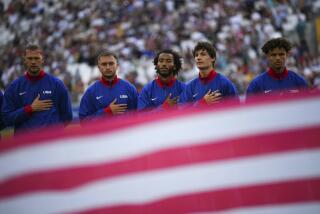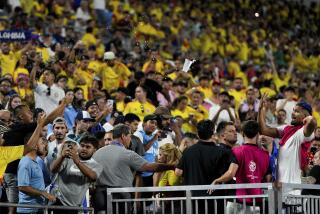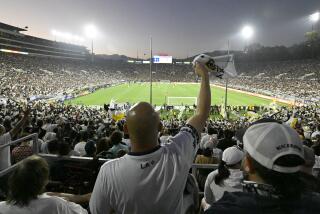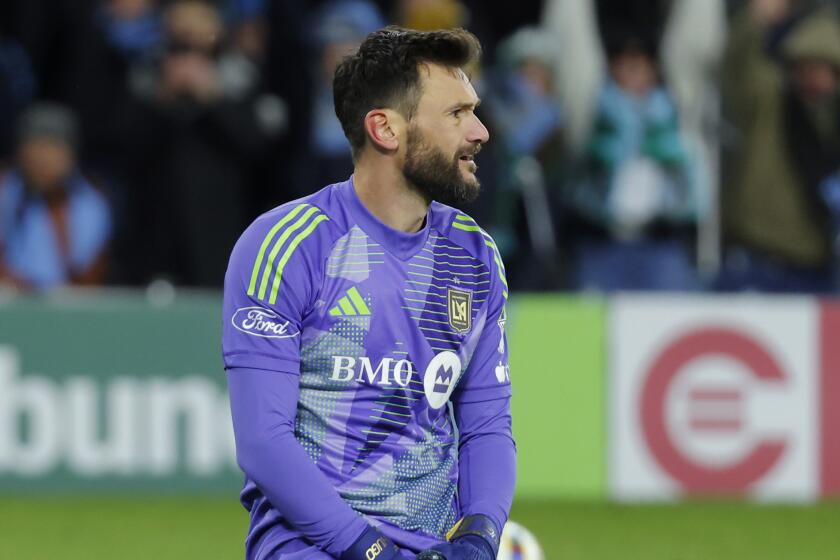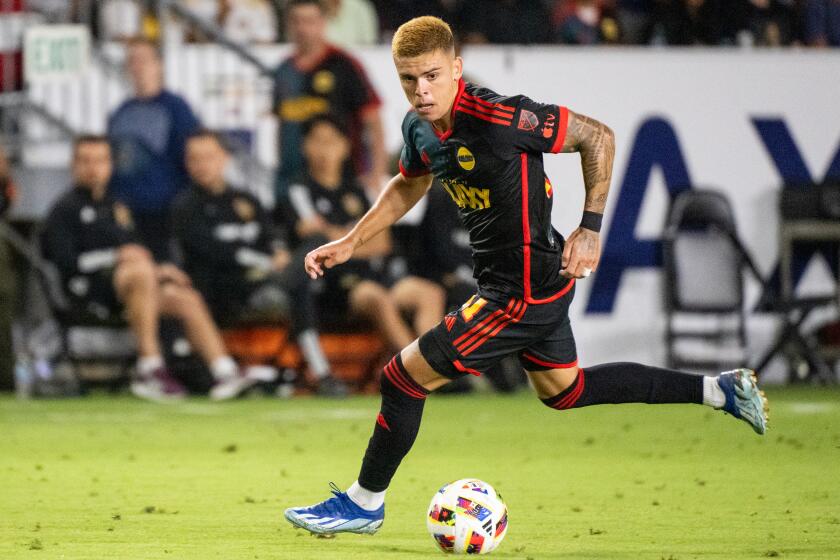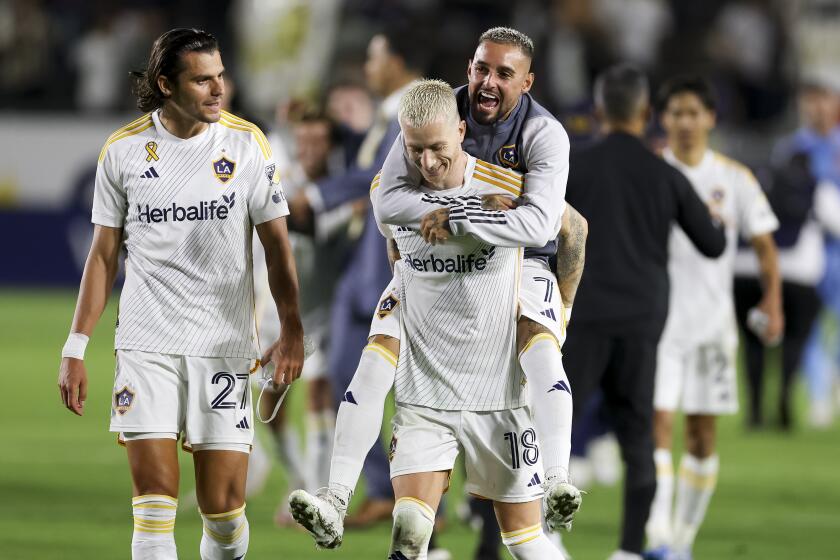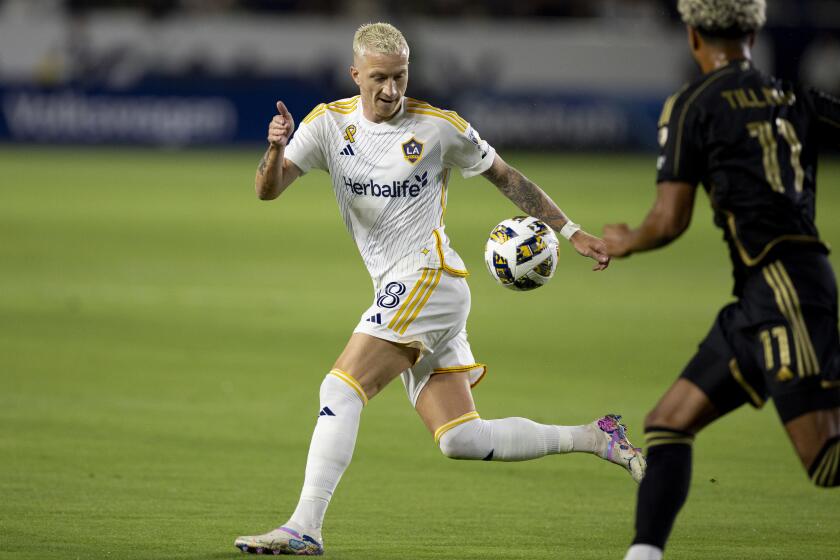U.S. fans making their mark in Brazil
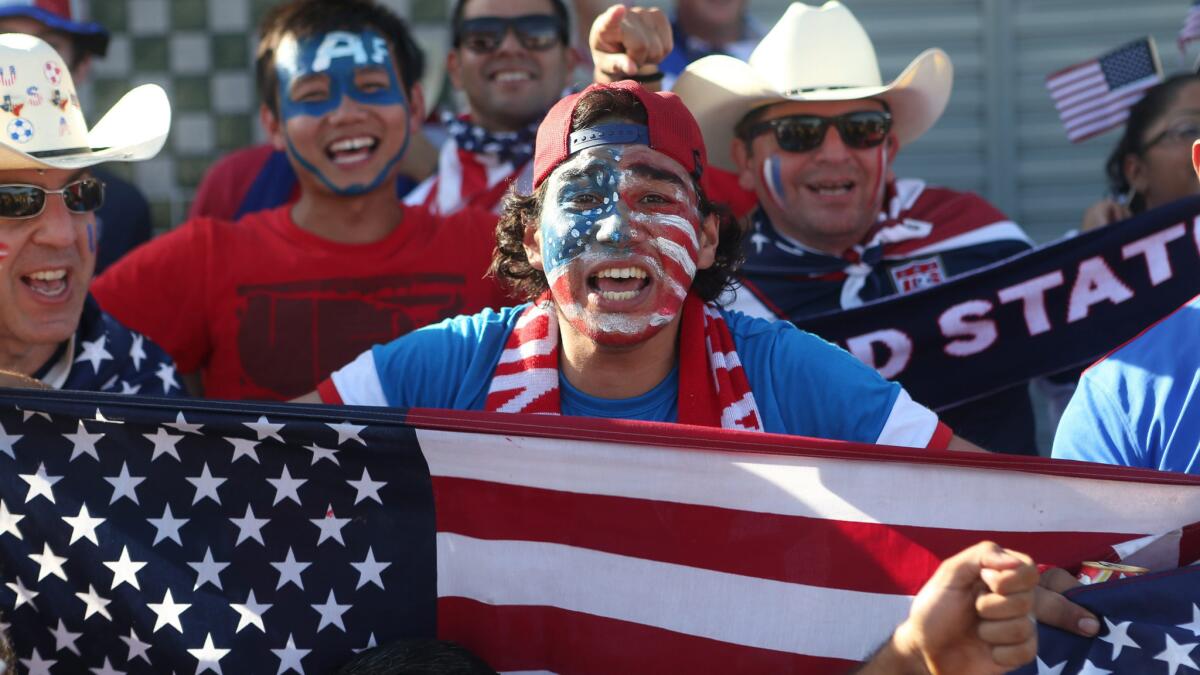
Manaus is more a sauna than a city, a frontier outpost in the middle of a rain forest 200 miles from the equator.
It’s the last stop before the Amazon and not the kind of place where you’d expect to see grown men walking down the street wearing face paint or spandex suits in the colors of the American flag. Yet that’s exactly what it looked like last Sunday for the World Cup soccer game between the U.S. and Portugal.
Soccer may still be trying to find its place in the top tier for U.S. sports fans, but the national team’s rabid and colorful supporters have already carved out a niche of their own in Brazil, where they outnumber fans from every country except the host nation.
“I’ve been to NFL games, NBA, even summer and winter Olympics,” said Carol J. Chen, a 26-year-old medical student from Claremont who attended the first two U.S. games in Brazil and will also be at Thursday’s group-play finale with Germany in Recife. “But the World Cup is on a whole other level. Every single person is invested in the game.
“The costumes are outrageous, the characters are outrageous, the fans are outrageous. And it’s completely normal. When you sit with other fans of your nation, and you’re all singing the national anthem or chanting the same chant, there’s this feeling of brotherhood that can’t be replicated anywhere else.”
No one knows exactly how many U.S. fans are in Brazil for the World Cup. The tournament’s organizers say more than 154,000 World Cup tickets were assigned to buyers in the United States, about 15% of the total made available internationally and nearly four times the number sold in any other country outside Brazil.
But those numbers are from April; another 180,000 tickets were made available after that and FIFA, the world governing body for soccer, has refused to disclose who bought them. Even that’s not a good indicator because many of the tickets bought in the U.S. went to supporters of other national teams, such as Mexico, and thousands more fans came to Brazil empty-handed, hoping to pick up tickets on the secondary market.
What is certain is the U.S. has made its presence felt here. And it hasn’t been an invasion as much as it has been an occupation.
“I didn’t think there would that many,” said Mat Presort, who spent more than $3,000 to fly from Florida for the U.S. team’s World Cup opener in Natal last week. “I saw more Americans than anybody else, including Brazilians. Every Brazilian we passed was chanting ‘USA, USA.’”
That game drew nearly 40,000 people, almost half of whom were carrying American flags, wearing U.S. jerseys or with faces painted red, white and blue. Some did all three.
“When we are standing on the field in Natal before the game against Ghana and the entire stadium is singing the national anthem, you get goose bumps,” U.S. midfielder Michael Bradley said. “It’s what you dream of — playing in a World Cup in a stadium full of American fans. And to have that stadium be in Brazil but still full of American fans is pretty special.”
Sunday in Manaus, where the U.S. played Portugal to a draw, the number of U.S. fans was slightly smaller but no less intense. And for a while the competition in the stands was fiercer than the one on the field.
The first chant — a thunderclap, really — of “USA! USA!” began nearly an hour before kickoff. And the fans, some dressed like Wonder Woman or Captain America, others in cowboy hats or lucha libre masks with American flags knotted around their necks like capes, grew even louder when the U.S. team came out for warmups.
The Portuguese, hopelessly outnumbered, quickly returned fire, chanting “Por-tu-gual! Por-tu-gual!” And the game hadn’t even started yet.
Once it did, though, things didn’t change much.
“You’re on your feet the entire 90-plus minutes and no one asks you to sit down,” Chen said. “You’re cheering, jumping, screaming, and chanting your head off every minute. There’s so much passion for the game, the energy is electrifying. “
The largest single contingent of U.S. fans in Brazil belongs to the American Outlaws, a dues-paying supporters group that, in seven years, has grown from three friends in Lincoln, Neb., to more than 20,000 members spread among 141 chapters nationwide.
Four years ago the Outlaws took 50 members to the World Cup in South Africa. Earlier this month they chartered two planes to ferry more than 10 times that many to Brazil, where they filled five beachfront hotels. From there they flew to Manaus for Sunday’s game and they’ll bus the 180 miles from Natal to Recife for the match with Germany on Thursday.
Part of the Outlaws’ appeal is the camaraderie. The other part is the beer, which began flowing with gusto more than 24 hours before each of the first two games and continued through the pregame tailgate parties and the group’s massive — and ear-splitting — march to the stadium in Natal.
“It’s really like a religion. It’s a brotherhood,” said Christopher Michael, an Outlaw from the Bay Area who was still wearing his U.S. jersey nearly six hours after the team’s first World Cup game.
“I love football. I love the U.S. Put them together and it’s so much fun being part of something that’s bigger than yourself.”
The players feel that too.
“It almost felt like a home game,” midfielder Kyle Beckerman said. “Being far away and having all those fans there for us was just an amazing feeling.”
In fact the Outlaws have become such a ubiquitous part of U.S. Soccer, their favorite chant — “I believe that we will win” — now has its own World Cup commercial on ESPN.
“You hear the national anthem before a game and it’s like ‘What more do you want?’” said Andrew Liotta, Michael’s traveling partner. “A huge American flag is your whole section with guys you never met just cheering for your country, watching people fight for it on the field.”
Michael and Liotta traveled more than 20,000 miles between them to attend about a half-dozen of the U.S. team’s games over the last year — which, in Outlaw circles, makes them homebodies.
Dale Houdek, who works for American Express in New York, missed only one of the team’s 23 games in 2013. And he wouldn’t have missed that one had the date in Sarajevo been announced early enough to gather the necessary travel documents.
Others spent tens of thousands of dollars to travel to parts of Central America and the Caribbean for all 10 of the team’s World Cup qualifiers.
“It gets in your blood,” said Houdek, whose love affair with soccer began in college when he watched the Brazilian team train during the 1994 World Cup in the U.S. “We all have local teams. You support the Lakers or you support the Knicks or the Suns. This is a world sport. And we’re part of it by traveling all over the world.”
Despite their loyalty, the vast majority of Outlaws have never met a national team player. And most don’t want to because they’re supporting the team, not its players.
No Landon Donovan in Brazil? No problem.
“It’s for the shirt,” said David Chamberlain, a preschool teacher from San Diego who spent $6,000 to follow a U.S. “B” squad around the country during last summer’s Gold Cup tournament. “It’s whoever’s playing for the team that gives us the best chance to win. That’s all we care about.”
And that passion has won the team attention even in Brazil, where soccer is less a sport than it is a religion. Globo, the country’s massive media empire, dispatched a team to cover the Outlaws’ pregame party last Saturday in distant Manaus and the newspapers have published reverential articles about the U.S. fans.
“The locals in Manaus and Natal love Americans, especially the ones who are dressed up,” Chen said. “The streets were lined with locals wanting to get a photo with the crazy Americans.”
If the U.S. advances to the second round, which wasn’t expected, some supporters will change their plans and stay. But thousands more say they have no choice but to reluctantly abandon the team and head home, their vacation days — and wallets — exhausted.
“I don’t have time to stay,” said Michael, who has commitments back in California. “Hopefully, we’ll miss some games.”

